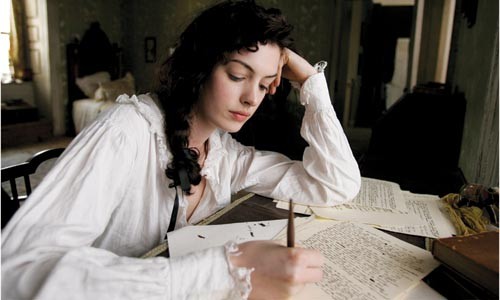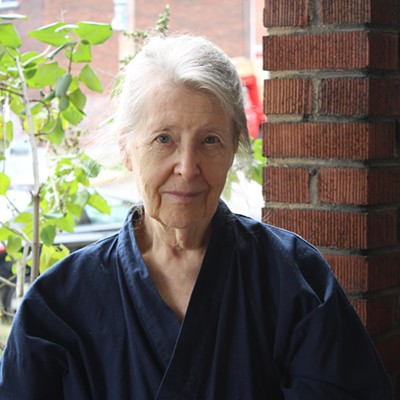In the opening scene of Becoming Jane, the young Jane Austen (Anne Hathaway) has writer's block: The words just aren't coming. The problem, it turns out, is that neither is she. But soon she'll meet Tom Lefroy (James McAvoy), a raffish young Irishman and rising attorney whose wealthy uncle, a judge, has banished him to the country for a summer to punish him for his gambling, drinking and whoring around in London.
In real life, Austen and Lefroy had a "flirtation" whose details and indulgences are unknown. So Becoming Jane speculates on what might have happened. It's an appropriate project, considering one of the movie's assertions: that authors write from real life when they can, and then use their imaginations when they can't.
Becoming Jane, directed by Julian Jarrod, is an entertaining costume drama that bullet-points its themes concisely while stopping well short of killing us with them. In Austen's world (1775-1817) of 18th-century England, women either had money or married it. Jane's father (James Cromwell), a minister, married her mother (Julie Walters) for love, and now, after three decades of marriage, Mrs. Austen tends the hogs. (Although, to her delight, Rev. Austen still works on perfecting his cunnilingus.)
Jane has an offer of marriage from the soon-to-be-wealthy nephew of a childless dowager (Maggie Smith). But he's somewhat withdrawn, and so she pursues her feelings for Lefroy, naturally á la Benedick and Beatrice for a while (they "meet cute" three times). There are many kinds of happy endings, and the unrequited lovers finally find theirs, albeit not together, as history records. Becoming Jane ends with a lovely coda, a few decades hence, in which the famous authoress passes along a bit of hope to the next generation, the teen-age daughter of an old friend.
This will all delight the Anglophiles and the Masterpiece Theater crowd, although I found it to be somewhat mannered and drained of emotion. Still, if we don't get a palpable sense of Jane's challenge, then at least we get an informed one.
Becoming Jane is as much a story of economics as it is of love, and by exploring the difficulty Jane faced in wanting to support herself, we also see how her books were, in a sense, co-written by her culture. Propriety drew the line at Austen writing books about liberated women, even if she was one. Her characters had to end up married, and married well.
There's a randiness about the edges of Becoming Jane, but mostly it remains tame, like an Austen novel accented with some conventional modernism (small "m"). The two leads help a lot: McAvoy (The Last King of Scotland), a charming Scottish actor whose gently swollen eyes look older than the rest of his face; and Hathaway (The Devil Wears Prada), whose full lips can't mask a hint of sexy overbite. Miss Austen has never, ever looked better. 
Starts Fri., Aug. 10














